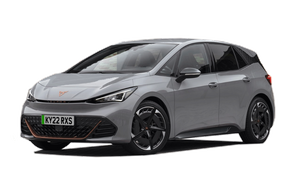Introduction and model history
The Electrified GV70 was launched in petrol and diesel form in 2020 and has proved a popular car in North America and Genesis’ home market in Korea. The electric version was added to the brand’s range last year and competes directly with cars like the BMW iX3, Mercedes EQC and Jaguar I-Pace. With competition as strong as that, the GV70 is going to have to impress on all fronts if Genesis is to have a hope of competing in what is a badge-obsessed sector of the market.
Battery, range and charging
The Electrified GV70 is only offered with one battery - a 74kWh (usable) pack that’s common across many Hyundai family models. In the most efficient of those cars it offers well over 300 miles on the WLTP test cycle. In the bulky, upright GV70, the official range is a slightly lower 283 miles, with a stated efficiency of 3.2 miles/kWh. In our time with the car we saw around 3-3.1m/kWh, which the trip computer estimated would get us 235 miles on full charge.
The GV70 comes with a heat pump as standard, which should reduce the impact cold weather has on the range and, for £900, you can also specify a vehicle-to-load charging package. This will let you power everything from a laptop to a coolbox or even an electric bike from the GV70’s battery via either a charge port adaptor or a three-pin socket in the car’s boot.
Like all the cars based on this platform with its 800V architecture, the GV70 offers up to 225kW charging, which means an official 10-80% charge time of just 18 minutes. As we know, conditions have to be perfect to achieve close to that but we did see our test car sucking energy down at 200kW with ease, adding 40 miles of driving in just six minutes.
Practicality and boot space
The GV70 is a pretty big car and thankfully, its exterior dimensions translate into plenty of space on board. Those in the front seats have acres of room in every direction, even with the chunky centre console between them, and the endlessly adjustable memory seats mean drivers of all shapes and sizes will be able to get comfortable.
Rear space is similarly generous, even behind a tall driver. The back seats recline and even with the panoramic roof and slightly sloping ceiling only the ridiculously tall will struggle for headroom. Four adults will easily be able to cover long distances in comfort here.
The GV70 can seat five but the middle passenger will feel pretty hard done by. The cushion is not only narrower than the two outer seats but it’s shorter too, offering less leg support. And, of course, it misses out on the heated seats
Behind those seats, there’s 503 litres of boot space, virtually identical to that offered by the Genesis’s key rivals. That’s 37 litres less than the ICE versions of the GV70 but the Electrified pulls a bit back with a 20-litre frunk that’s ideal for storing charging cables. Folding down the 60/40 split rear bench expands the storage space to 1,678 litres, accessed via a standard-fit powered tailgate.
Design, interior and technology
The premium SUV segment isn’t always praised for its taste or subtlety, so Genesis has played things nicely with the GV70, doing enough to stand out without going over the top.
All Genesis models, saloon or SUV, share the same basic design principles but the GV70 is one of the most handsome thanks to its well-judged proportions. At the front the massive “crest” grille with its diamond motif gives the Genesis a unique identity even in a segment where big faces are de rigueur. The grille also features probably the neatest charge port integration around - the diamond-shaped door disguised perfectly in the grille’s criss-crossing pattern.
Either side of the grille are slimline split-level LED headlights whose shape are echoed in the equally neat quad tail lights which wrap around the rear flanks and stretch almost to the centre of the tailgate. A couple of sharp creases along the wings and doors link the two sets of lights and stop the GV70 from looking too slab-sided, while softer curves, especially around the nose and tailgate, mean the GV70 looks assertive without veering into aggressive. Compared with the fussy styling of the BMW or the bland melted-plastic look of the Merc, the Genesis strikes a nice balance.
Genesis talks about the “beauty of white space” at play in the GV70’s interior, using reductive design to help create a feeling of spaciousness without embracing the austerity of Volvo or Tesla - who seem on a mission to take minimalism to extremes.
There’s an organic curved look to everything that’s a welcome change to the sharper edges of something from BMW or Audi. The leather-topped dashboard flows smoothly from door top to door top and sweeps over the instrument pod, while everything from the air con control panel to the glovebox handle has a soft rounded finish.
That soft look is matched by soft-touch finishes wherever you’d want them and complemented by a robust, high-quality feel from all the switches and controls. Thankfully, there are plenty of switches and controls too. Although it talks of reductive design, Genesis has sensibly left simple physical controls for important features such as the climate control, drive modes and volume, while many of the driver assist systems are managed by well-conceived steering wheel buttons.
There’s a rotary controller for the 14.5-inch infotainment system (although the screen is also touch-sensitive) but this is a similar size and shape to the drive selector, making for a slightly confusing centre console. That system is sharp and responsive, and packed with connected features covering everything from navigation to the weather and calendar integration. There’s also standard Android Auto and Apple CarPlay for those seeking a simpler interface. Sadly a head-up display is only offered as part of a £3,000+ option pack.
Genesis might be part of the Hyundai family but, as mentioned above, the mixture of leather, wool, metal and glass around the cabin mark it out as a completely different prospect and one well-equipped to compete at the premium end of the market. Go for the Nappa leather package and the already high-end seats are finished in a sumptuous quilted material.
Tick another option box and you’ll end up with 18-way electrically adjustable seats with heating, ventilation and a massage function. These also feature Genesis’s smart posture assist, which subtly adjusts the seat and activates the massage function to stop your back going stiff on long journeys. The same option pack adds heated seats for your rear passengers, who can also benefit from their own third climate control zone.
To make sure everyone on board is suitably relaxed, the GV70 features acoustic laminated glass and active noise cancelling which uses the car’s sound system to effectively block out external noise. It means that even at motorway speeds, the GV70’s interior is as quiet as a library, so you can fully appreciate the bespoke sound stages of the Lexicon stereo.
Motors, performance and handling
The biggest complaint about the ICE versions of the GV70 were that the engines weren’t smooth or quiet enough to match its premium pretensions. The Electrified version addresses that with aplomb, bringing the luxury-level refinement the rest of the car deserved.
There’s only one drivetrain available, a twin-motor, four-wheel-drive setup shared with the GV60. In the GV70 this produces 430bhp in normal conditions, with 483bhp available for short periods when the boost button on the steering wheel is pressed.
Even in this 2.3-tonne SUV, that means a 0-62mph time of 4.2 seconds and a top speed of 146mph. That’s not quite enough to keep up with the monsters of the segment, such as the Kia EV6 GT or the Ford Mustang Mach-e GT, but the GV70 is a different beast, built more for quick but calm progress than B-road shredding.
That being said, the Sport mode does unlock a surprising level of performance. Select it and throttle response, power delivery and the steering speed sharpen noticeably. The steering isn’t the most communicative but there’s enough feedback to breed confidence in the car, enhanced by plenty of grip. The adaptive air suspension also stiffens up and improves on the already impressive body control, meaning you can cover cross-country routes with remarkable rapidity.
Dial the drive modes back to Comfort or Eco and you’ll get exactly what you expect. There’s a clear step down in performance in Eco, while Comfort is where you’ll likely spend most of your time. There’s still plenty of power on tap but a calmer overall feel that’s more suited to the car’s refined ambience. And the suspension, which impresses even in Sport mode, becomes truly cosseting thanks to technology that scans the road ahead and adapts to upcoming lumps and bumps.
There’s also an e-terrain mode with three settings which alter the GV60’s all-wheel-drive powertrain to handle mud, sand or snow, should you ever encounter such hazards.
Along with that and the regular preset drive modes, the GV70 offers five levels of braking regen selected via large paddles behind the steering wheel - from zero right up to full one-pedal driving, referred to as “i-pedal”, plus a smart adaptive setting. The progression between the levels is smooth and the i-pedal works brilliantly, meaning you rarely need to go near the brake pedal. The only issue is that it resets to level 3 whenever you switch off the car, but a long pull on the paddle will reactive i-pedal. It’s frustrating to have to do this every time but at least the solution is a simple one rather than being buried in a touchscreen menu.
Safety and sustainability
As you would expect from a high-end modern car, the GV70 scored a maximum five stars in Euro NCAP testing, with a 89% score for adult occupant protection and 87% for child occupants.
It also scored 87% for its safety assist systems, of which there is no shortage. Standard kit includes adaptive cruise control and lane keep/follow assist that work together to form the Highway Drive Assist feature. There’s also forward collision avoidance assist that covers normal driving and junctions, warning if you’re about to turn into the path of oncoming traffic. And rear blind spot collision avoidance warns of hazards behind the car.
The £3,620 Innovation Pack brings a host of additional driver aids, from a large head-up display, blind spot cameras and adaptive quad LED headlights to a system that stops you reversing out of a parking space into the path of other vehicles. There’s also Highway Drive Assist 2, which expands on HDA to include semi-autonomous lane changing. This responds to indicator inputs and uses cameras and sensors to determine when it’s safe to pull out. It works accurately but is so glacially slow you’ll probably get bored waiting for it to complete the manoeuvre and take over yourself.
Genesis is keen to highlight its vision for sustainability. From 2025 all its new models will be fully electric and it has ambitions to become completely carbon neutral by 2035 - from raw materials right through to the finished car. The brand points to its current EVs - the Electrified GV70 and electric-only GV60 - as leading the way in terms of on-road impact and the use of sustainable materials to reduce its environmental footprint.
For the GV70’s part, the headlining, pillars and sun visors use fabrics made from recycled plastic bottles and nylon yarn from fishing nets. The optional Nappa leather is also made using sustainable, bio-processed dye in the tanning process, while the regular upholstery is a combination of leather and wool panels.
Running costs and pricing
In keeping with its premium positioning, the Electrified GV70 comes with a premium price. The Sport model - the only one currently on sale - starts at £65,105 before you begin adding options like fancy paint and 20-inch alloys. The BMW iX3 or Mercedes EQC both start at a similar price, and the cheapest Jaguar I-Pace is £70,000. Standard specification is generous but our particular test car was still weighed down by £15k of luxurious extras such as heated rear seats and the panoramic roof.
Genesis also offers all customers a free five-year care plan that outstrips anything in its segment. This includes warranty, annual servicing, roadside assistance, courtesy car, 24/7 helpline and over-the-air vehicle updates. And rather than taking their car to the dealership for maintenance, Genesis will collect and return the car at a time and place that suits the owner.
GV70 verdict
The GV70 is arguably Genesis’s best all-round car and the Electrified GV70 is the best version of that car by some margin.
Its impressive drivetrain brings the refinement and performance that the car deserves, packaged with a decent real-world range and ultra-rapid charging. And it balances on-road sportiness when you want it with a serene ability to waft along.
On top of that, the interior is a spacious, well-equipped and user-friendly environment where passengers can relax, isolated from the trials and tribulations of the outside world thanks to smart noise management and impressive ride quality.
Genesis might not be as established a name in the premium segment but the GV70 is more than worthy of consideration alongside its more familiar alternatives.































